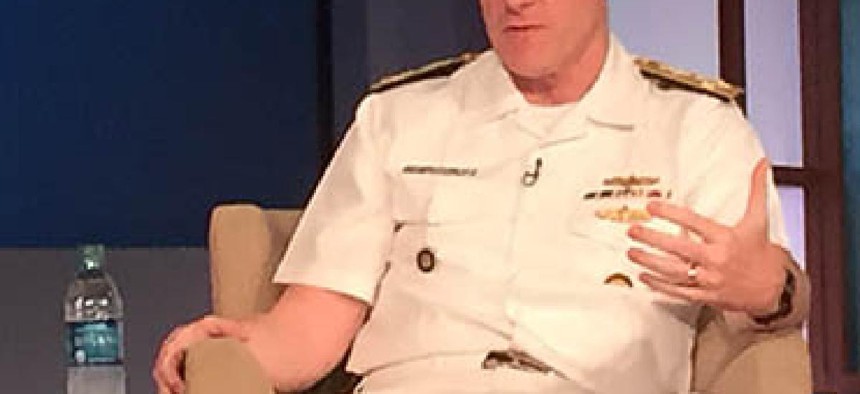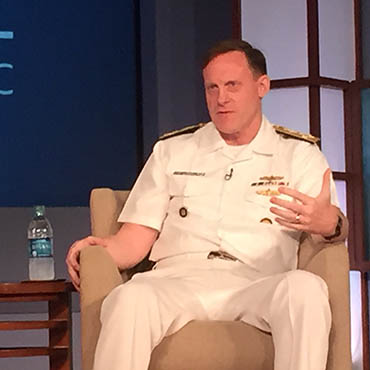NSA chief in the crosshairs

Top defense and intelligence officials are pushing for the removal of the head of the NSA and U.S. Cyber Command in what appears to be a last-minute bid to split the two entities.

Current NSA and CyberCom leader Adm. Mike Rogers is at the center of a clash about whether to restructure the U.S. military's cyber posture.
Questions continue to mount as to whether the White House will remove Navy Admiral Michael Rogers as head of the National Security Agency and U.S. Cyber Command, and whether the two entities can and should be split before President Barack Obama leaves office.
According to a Nov. 19 Washington Post report, Secretary of Defense Ash Carter and Director of National Intelligence James Clapper sent letters to the White House calling for Rogers to be removed. The reported motivation behind the letters was a mix of dissatisfaction with Rogers’ job performance and desire to clear him out of the way to move forward with the NSA and Cyber Command split.
When asked about Carter’s letter at a press briefing, Pentagon Press Secretary Peter Cook said he would not discuss personnel conversations between the secretary and the president. NSA and ODNI similarly did not respond to requests for comment.
Representative Devin Nunes (R-Calif.), chairman of the House Permanent Select Committee on Intelligence, has called for Carter and Clapper to appear at a hearing to discuss their letters. His office told FCW that DOD has not responded to his request, and ODNI officials are asking for another day to give their reply.
At the center of the issue is the ongoing debate whether Cyber Command should be split off from NSA and made an independent DOD combatant command. Rogers has said publicly that he believes the entities should be split, but has argued that it should happen "at the right time."
There has been speculation that Rogers has been dragging his feet on that timing, contributing to the call for his ouster.
There is broad agreement among current and former officials that Cyber Command should be elevated to an independent combatant command. During his Senate conformation hearing in September, the new head of U.S. Strategic Command, which oversees Cyber Command, stated that Cyber should be elevated, but the "dual-hat" leadership structure should be maintained.
One senior DOD official told FCW that arrangement was not a feasible solution as the two entities would require separate leaders. The official stated that Cyber Command has benefitted greatly at the strategic level from Rogers' dual role and his ability to share information and capabilities, but there have been tradeoffs at the operational and tactical levels by having one leader stretched across two entities.
Sen. John McCain (R-Ariz.) has been one of the most vocal opponents of splitting the two agencies, arguing that Cyber Command lacks the personnel and capacity to operate without the capabilities of the NSA. McCain has vowed to oppose any attempt to end the "dual-hat" leadership structure of NSA and Cyber Command.
The DOD official also stated that if the agencies are split, the NSA should still have a military head to minimize possible cultural clashes between the entities. The official said there are still many details to sort out before the split is made, and though not ruling it out said it appears unlikely to happen before the end of the Obama administration.
Former senior officials, meanwhile, told FCW McCain's concern about Cyber Command's capabilities is legitimate, but that can be offset if it is given the ability to "lean on" NSA going forward.
"Sooner or later you have to take the training wheels off," said a former senior intelligence official, who has expected that NSA and Cyber Command would be split once Rogers was gone -- his term runs out in the spring of 2017.
When asked whether or not Carter believed Cyber Command had the necessary personnel and capabilities to function as an independent command, DOD spokesman Cook said the secretary has "been very clear about the importance of Cyber Command, the importance of protecting our own networks, about making sure that we are addressing the threats not only today but the evolving threats of the future, and this has been part of the ongoing conversation as we look at this structure."
Cook did not rule out the possibility that the split could take place, saying that it was "ultimately this is a decision for the president to make."
Speaking at a press conference in Peru over the weekend, President Obama defended Rogers as a patriot, but kept open the possibility of splitting the agencies.
The president said that increasingly U.S. critical infrastructure and data are at risk, "and it is inevitable that we're going to have to modernize and update not just the tools we use to defend those assets and the American people, but also how we organize it. And it is true that we are exploring a range of options in terms of how we organize the mission that currently exists."


